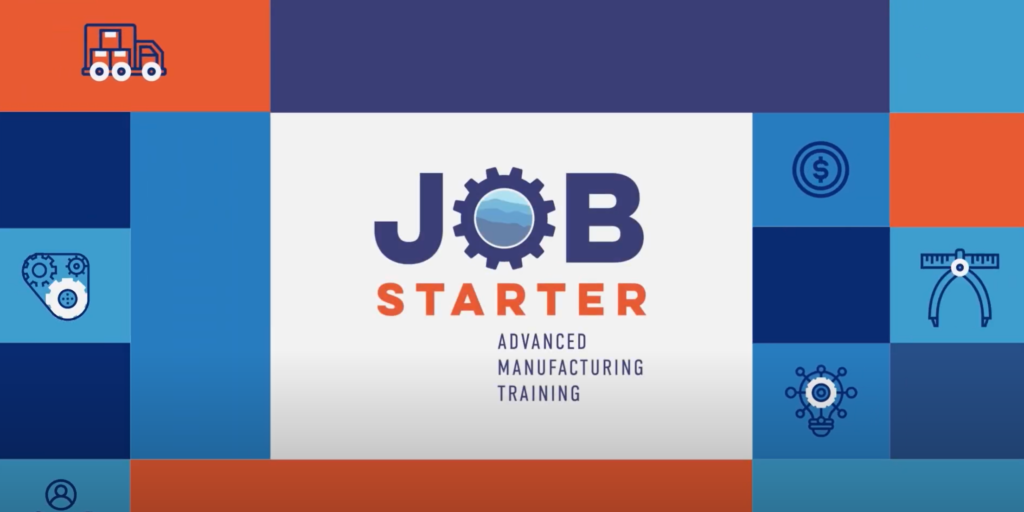
When Blue Ridge Community College (BRCC) received part of a $5 million grant to help train pharmaceutical workers in the region for a company struggling to access talent, other local employers began to take note. BRCC was attracting a pool of talented students, and Merck, the local pharmaceutical employer, was reaping the benefits of having a polished, hardworking pipeline of graduates. As the partnership between the college and employer strengthened, other employers wanted to see how they could join forces and solve their talent issues.
After a few employer-focused discussions, JobStarter was born. This paid, three-week training program gives students everything they need to pursue a career in advanced manufacturing, including a high chance of a job offer and a $1,800 stipend for their time.
We sat down with BRCC’s Kevin Ratliff, dean of workforce and continuing education, and Andrea Livick, JobStarter coordinator, to learn more.
Growing to new levels
After serving as the liaison connecting employers, students and teachers together to lift JobStarter off the ground, Ratliff quickly realized that he was going to need a dedicated leader to coordinate each program’s cohort. Livick was brought in to facilitate the program and ensure student and employer expectations were clear from day one, especially when it came to screening students and making sure they were in it for the right reason, big incentives aside.
Currently, Livick says they have found a “sweet spot” ratio of students to teachers, which consists of 16 students paired with eight employers. Having a smaller cohort allows for more in-depth discussions and gives employers the chance to really connect with each student.
Throughout the three-week program, students participate in two, four-hour sessions. In-class sessions are led by BRCC manufacturing instructors and local employers who bring the industry to the classroom. Students finish the course with a career readiness certification, along with a resume and personal finance class under their belt.
During the course, students tour each company’s facilities and participate in Q&A sessions with senior leaders. Livick says this interaction is mutually beneficial for both students and employers.
“The companies seem to know who they want, and the students seem to know where they want to go. It’s been really helpful,” said Livick.
Success stories
When asked about hiring success, Livick shared that 54% of last semester’s cohort were hired by participating employers. Some of Livick’s most notable students over the years include a student who moved to the U.S. from Mexico in ninth grade. He didn’t know how to speak English and was working for his family business when he discovered JobStarter. After completing the program, a company hired him from the manufacturing track to do sales for its operation in Mexico.
Livick described another standout student being a single mother of two kids who completed the program and is now working for Cadence.
“The companies have been very generous to us. They participate in this program, and they want to hire our students. They are not just putting their name out there,” she added.
The word is getting out
To be eligible for the JobStarter program, students must be 18 years or older, have reliable transportation and have earned a high school degree or GED.
Ratliff said marketing the program has been relatively easy when the offering for students is this good. “When you get paid to go to school, it’s pretty unheard of,” he said.
But sometimes all it takes is a friendly face to sell the opportunity.
“When we go on the company plant tours, JobStarter graduates are so excited to see the new group coming through. Last time, a former graduate pretty much sold the company to multiple students during the tour. When we hear from the students, it’s only positive feedback,” Livick said.
A bright future ahead
While BRCC’s JobStarter remains strictly manufacturing-based, adding new industries remains high on the list of priorities for the future, especially in the transportation and logistics field.
To conclude our discussion, Livick emphasized the value these hands-on training and pilot programs have on introducing students to new careers, even if they decide it’s not for them upon completion.
“Part of our role is to help them figure out if this is right for them, so these companies don’t waste time and money with the onboarding process. Two cohorts ago, we had this incredible student that received multiple job offers, and she decided in the end manufacturing wasn’t for her. That saved the company money, more than the $1,800 investment,” Livick said.
While JobStarter is currently funded through the Merck grant, Ratliff hopes to embed a FastForward eligible certification in the coming years.
To learn how you can be a part of the next cohort of JobStarter graduates at Blue Ridge Community College, visit their website here.